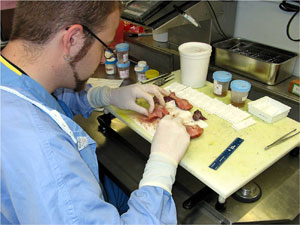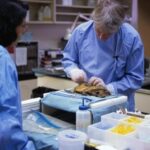Forensic pathology, the meticulous application of medical knowledge to legal quandaries, isn’t for the faint of heart. It demands a unique confluence of scientific acumen, unwavering composure, and a deep-seated fascination with the intricate mechanics of mortality. Are you drawn to the macabre, or repulsed? If you find yourself captivated by the complexities of death investigations, perhaps a career in forensic pathology beckons. But how can you definitively ascertain if this demanding, yet rewarding, field aligns with your intrinsic interests and aptitude?
1. Scrutinize Your Fascination with the Human Body: Delve into the intricate architecture of human anatomy and physiology. Do you find yourself mesmerized by the labyrinthine pathways of the circulatory system, or the delicate dance of neurotransmitters within the brain? A genuine interest in the human body, both in health and disease, is paramount. Can you stomach the sight of internal organs? More importantly, can you analyze them objectively, seeking clues to unlock the secrets of a life tragically concluded?
2. Evaluate Your Tolerance for the Macabre: Forensic pathology inherently involves exposure to death, decomposition, and trauma. A robust constitution is not merely a physical attribute; it’s a mental fortitude that allows one to maintain equanimity amidst unsettling circumstances. Consider whether you can objectively analyze potentially disturbing evidence without succumbing to emotional distress. Examine your reactions to fictional depictions of death and violence. A healthy detachment is crucial, but indifference is not. Empathy for the deceased and their families should temper one’s scientific objectivity.
3. Assess Your Aptitude for Scientific Inquiry: Forensic pathology is, at its core, a scientific discipline. It necessitates a rigorous understanding of pathology, toxicology, and ballistics. Do you possess a natural proclivity for scientific methodologies? Are you adept at formulating hypotheses, designing experiments, and interpreting data? A relentless curiosity, coupled with a methodical approach to problem-solving, is indispensable. The ability to discern patterns amidst chaos, to extrapolate meaningful insights from seemingly disparate pieces of evidence, is the hallmark of a skilled forensic pathologist.
4. Gauge Your Interest in the Legal System: Forensic pathologists serve as vital liaisons between the medical and legal realms. They are frequently called upon to testify in court, offering expert testimony on the cause and manner of death. Does the legal system intrigue you? Are you comfortable navigating the intricacies of courtroom procedure? The ability to articulate complex scientific concepts in a clear and concise manner is paramount. A forensic pathologist must be an effective communicator, capable of conveying their findings to juries, lawyers, and judges who may lack specialized medical knowledge.
5. Explore Relevant Literature and Media: Immerse yourself in the world of forensic pathology through books, documentaries, and scientific journals. Observe the work of real-life forensic pathologists, noting the challenges they face and the ethical considerations they must navigate. Reading case studies, such as those detailing the identification of skeletal remains or the interpretation of wound patterns, can provide invaluable insights into the day-to-day realities of the profession. Television shows and films, while often sensationalized, can serve as a starting point for exploring the field, provided they are approached with a critical eye.
6. Seek Shadowing Opportunities or Informational Interviews: If possible, arrange to shadow a forensic pathologist or conduct an informational interview with someone working in the field. Witnessing an autopsy firsthand, or simply engaging in conversation with a seasoned professional, can provide a realistic glimpse into the demands and rewards of the career. Ask about the challenges they face, the skills they deem essential, and the advice they would offer to aspiring forensic pathologists. Such experiences can solidify your interest, or conversely, reveal that the field is not the right fit.
7. Consider Relevant Coursework and Extracurricular Activities: Bolster your academic foundation by pursuing coursework in biology, chemistry, anatomy, and physiology. Participate in extracurricular activities related to science and medicine, such as volunteering at a hospital or conducting research in a laboratory. These experiences can not only enhance your knowledge and skills but also demonstrate your commitment to the field. Furthermore, consider joining a pre-med club or attending forensic science conferences to network with like-minded individuals and learn from experts in the field.
8. Reflect on Your Motivations: Ultimately, the decision to pursue a career in forensic pathology should stem from a genuine desire to serve justice and contribute to the pursuit of truth. Is your interest driven by a fascination with the macabre, or by a sincere commitment to helping others? A forensic pathologist’s work can bring closure to grieving families, identify perpetrators of violent crimes, and improve public safety. It is a profession that demands integrity, compassion, and a unwavering dedication to ethical principles. Consider whether you possess these qualities, and whether you are willing to dedicate your career to upholding the highest standards of professionalism.
9. Embrace the Continuous Learning Curve: Forensic pathology is a dynamic field, constantly evolving with advancements in technology and scientific understanding. A commitment to lifelong learning is essential for staying abreast of the latest developments and maintaining professional competence. Be prepared to engage in continuous medical education, attend conferences, and participate in research activities throughout your career. The pursuit of knowledge is not merely a requirement; it is a fundamental aspect of the profession, ensuring that forensic pathologists remain at the forefront of their field, equipped to provide the most accurate and reliable information possible.
Determining if forensic pathology is the right path requires introspection, investigation, and a willingness to confront the realities of death. It is not a decision to be taken lightly, but for those with the requisite skills, temperament, and passion, it can be a profoundly rewarding career.










Leave a Comment